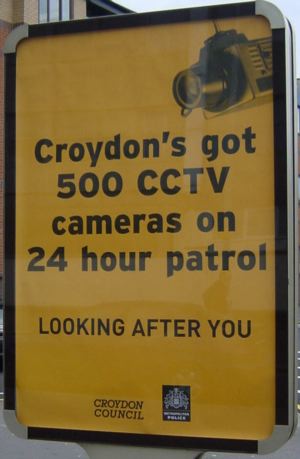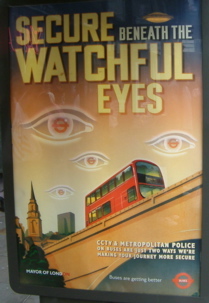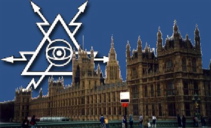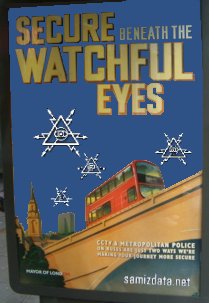We are developing the social individualist meta-context for the future. From the very serious to the extremely frivolous... lets see what is on the mind of the Samizdata people.
Samizdata, derived from Samizdat /n. - a system of clandestine publication of banned literature in the USSR [Russ.,= self-publishing house]
|
When looking at the world around us, it is impossible to constantly take everything upon which we must form an opinion back to first principles: life is simply too short for that.
But to decide if a dog might be about to bite you, one must have at least some understanding of the nature of dogs and how they might act differently to cats or parrots or foxes or hippopotamuses (the later being a rare sight in London it must be noted). Whilst the propensity of a Golden Labrador and a Staffordshire Bull Terrier to chomp on you varies considerably, both are nevertheless dogs and thus act within the range of doglike behaviours to which their natures impel them.
And so to understand anything done by a state, the workings of its parts and how they are likely to impact upon your life, one must understand some of the basic underlying truth about the nature of states. All states are not exactly the same just as all dogs are not exactly the same: whilst a libertarian such as myself might lambast the United States or the United Kingdom for many and varied sins, it is clear to all but the ‘rationality impaired’ that the USA and UK are currently significantly less harmful to their subjects than the likes of Iraq or Myanmar or China or Belarus or Zimbabwe.
So when I recently wrote a couple articles about posters by a government body (Transport for London) aimed at garnering public support for increasingly panoptic mass surveillance, some commenters (a minority it must be said) took exception to the idea there might be anything sinister about the vast proliferation of CCTV cameras in Britain to which the state has access. Britain after all, is not Nazi Germany or North Korea, so what is the problem?

Trust us. Constantly. The second you step out of your front door. Nevertheless, all states, like all dogs, do indeed share some common irreducible aspects to their natures. Without getting into the intractable and interminable minarchist versus anarchist inter-libertarian debates of the legitimacy of any form of state, it is fair to say all modern states however democratic and ‘liberal’ suffer from a type of progressive moral cirrhosis. Take the remarks in the Telegraph regarding Britain’s socialist National Health Service:
Rather as in the old Soviet Union, many managers now think it safer to fiddle their returns rather than send bad news back to the centre. This week, for instance, the Department of Health claimed that no one now has to wait more than 24 hours in accident and emergency, a claim that was flatly contradicted by the BMA [British Medical Association]. It has got to the point where we now routinely expect schools to massage their test results and hospital managers to fiddle their waiting lists. No wonder people’s everyday experience of schools and hospitals so rarely seems to accord with the glowing reports presented by the Prime Minister and his colleagues in the House of Commons.
Yet Britain is not the Soviet Union and although it does imprison the most number of people per capita in Europe, there is no network of gulags or mass murders to enforce the governing party’s supremacy. Unlike Saddam Hussain, who holds sham elections in which 100 percent (‘if not more’) vote for him, in the democratic western world, elections are free and fair. Well, sort of. They just gerrymander the way people vote. Of course this is not the same as what Saddam Hussain does but it is certainly the same species of behaviour.

Democracy, Iraqi style: happiness is mandatory

Democracy, American style: representing who exactly?

Democracy, British style: looking after you, like it or not.
(Photo: Mike Scott) So why, given that we are constantly told how superior democratic states are to their benighted totalitarian counterparts, do we see time and time again the same toxic behavioral characteristics, albeit manifested in less homicidal ways?
It is because all modern states exist primarily to do things. By this I mean do more than just guard the boundaries of society (i.e. keep out marauding Turks, put out fires, run law courts). All states have always done things, such as waged wars, built aqueducts or whatever, but not all states have existed to primarily do things beyond aggrandise the King/Tzar/Chief/Khan/Sultan etc… stay out of the state’s way and it tended to leave you alone. That did not mean that such states were not capable of acts of breathtaking tyranny, just that unlike an overtly interventionist state such as we all live under these days, to a large extent the pattern of your life was social rather than political: if your children were schooled, it was because that was the custom and it seemed the thing to do, rather than because the state threatened you with arrest if you did not acquiesce to your children being conscripted for mandatory collective education.
Much like dogs, some states are more vicious than others but ultimately the people who grasp the levers of power do so in the knowledge that they are there to do things and that knowledge alone is the source of their inevitable corruption by the system they are part of. That is why in the long run it does not matter which state wants to envelop their subjects in panoptic surveillance, because in the end no state can be trusted to have such information at its casual disposal because states cannot be trusted to act other than as states, and all states are to a lesser or greater extent corrupt. It is the nature of the beast.

There has been enormous interest regarding the Samizdata.net article last Wedneday about the bizarre poster appearing across London. The large number of comments and e-mails that people have left present a wide range of fascinating views and a few rather odd theories.
Serial comment writer Molly does not like the look of Britain’s future
The poster of the ‘kindly’ authorities watching us that Perry de Havilland wrote about on Wednesday scared the hell out of me. Is that really how they see themselves? Do they really think we want to have our movements watched? Do they actually think that a bunch of gobshites full of beer on a bus are going to be made to behave by a camera?
The fact is if you have ever had your house broken into in Newcastle (and I have lost count) then you know that the boys in blue, when they turn up a day later to take down your details, are never ever going to catch them. They are just going through the motions. If you are assaulted and raped by someone you do not know, they will take a statement and look around for evidence for a few minutes (like, maybe he dropped his f**king business card perhaps?) and then give you the telephone number of some tax funded and utterly pointless ‘counsellor’ to talk to who will keep forgetting your name.
And yet if you take a baseball bat to a burglar, they will throw the book at you because they know who you are and where you live. Of course they do because you foolishly called them to come.
All the people who live off my taxes, both the ones who empty my meagre bank account to ‘provide me with services’ and the ones on the dole who break into my house to steal what I have left, seem to me to be on the same side most of the time. David Carr is right that if ‘security’ is why the state is watching us, it certainly does not seem to be our security.
No, I am not sure why the cameras are going up but it sure as hell has nothing to do with my safety. The people who put them up do not give a f**k about that, this much I know for sure.
Molly

The future?
Taking a bus to Brixton from Streatham this afternoon, I saw the Big Brother posters which assured me I was safe. Considering I was in one of London’s three murder hotspots, the posters seemed appropriate. In Coldharbour Lane the new multimedia telephone kiosks were empty yet there were queues outside them. These were the drugs hustlers who called out “Grass”, “Charlie” and “Horse” as I walked past.
Directly beneath a bus lane camera a car blocked the bus lane. I was reminded that when the security cameras were installed in Coldharbour Lane one of them didn’t work. Any guesses where a murder was committed? Yup, directly beneath the faulty camera.
In Kingston-upon-Thames a few years ago a jeweller’s shop was discovered to be the only shop in the street which couldn’t be seen from the array of cameras. A nice dark alleyway running alongside was also unaccountably off-screen. Any guesses how this was discovered? Yup, when a gang burgled the shop.
At least there is no suggestion that inside information could possibly have contributed to these crimes.
I was prompted by Perry’s post below to refer to a London newspaper story I saw yesterday.
The fig-leaf justification provided for establishing a panopticon state is that we all be a lot safer as a result. Pity it didn’t work in the case of this gut-wrenching story of a man who was set upon by a gang outside an underground station in North London and beaten to death for no other reason than he had the misfortune to be in the wrong place at the wrong time.
Where was all the security state apparatus? What about all those CCTV cameras? Do you think this man’s family might want to ask themselves why they’re being sold a pup?
Police States are all about security; not our security, mind.
Across London, these posters can be seen telling us all that we are ‘Secure beneath The Watchful Eyes’ of the Metropolitan Police. I cannot tell you how much better that makes me feel. The imagery is pure 1930’s/1940’s and conjurors up the ‘Golden Age of Totalitarianism’.
Britain is already a Police State in so far as the means for total repression are already well and truly in place. As the poster indicates all too well, Britain is the nation most under surveillance on Earth, Echelon monitors our domestic communications, our Internet usage is logged for years due to the Draconian RIP Act, our locations detected via our mobile phones and logged, all for the apparatus of state to access on very low level authority. Civilians are not just deprived of any firearms, in reality we are forbidden to defend ourselves and our property with so much as a broom stick. Our right to trial by Jury faces abridgement, even our ancient protection of Habeas Corpus is now a dead letter under European extradition laws.
Yes, we still have a fairly free press, in so far as the media are strong enough to prevent restrictions against their actions… yet do not dare to make an allegedly ‘racist’ remark or pour scorn on someone’s religion or make a joke about Wales: if you do then expect to find yourself up in front of the Beak justifying yourself under threat of fine or gaol, and forget saying “I was just exercising my right to freedom of speech”.
Is it any surprise that the powers that be feel they can dare put posters announcing that you are ‘Secure beneath The Watchful Eyes’. Secure? From what? Surveillance increases daily at the same times as crime soars out of control, so if we are not ‘secure’ from crime, then what exactly is being secured? We face many threats in the modern world but the biggest comes from the people who would watch our every action so that the State may choose to judge us when it sees fit.

How long before we start seeing this poster?
Update: See follow up articles to this one on Samizdata.net here and here
After periodic, and if the truth be known, inevitable paedophile scandals in Britain of the sort that occurs in every school system in the world, checks on the backgrounds of teachers have been stepped up and made more rigorous. No problem there as if someone has a history of paedophile activities, it is entirely reasonable that a potential educational employer should want to discover that.
But then why does the state insist that as part of this information gathering process, that the prospective teacher reveals their banking details and how to access their secure password to get at their financial details?
It is because the Panopticon state regards privacy as in and of itself a cause for suspicion.
Let me write a little fiction for a moment:
John is in his late twenties and an Internet power-user. He uses it for work (he is an independent consultant of some sort), he uses it for games (he is a dab hand at playing on-line, feared amongst the community of Alien vs. Predator 2 gamers) and, being a guy, he likes to trawl through Usenet newsgroups to find pictures of who ever his babe-de-jour is… he is currently rather keen on Britany Spears (my, my, she is aging well).
One night, he visits one of his favourite newsgroups: alt.binaries.celebrities.nude
The list of articles builds, then he casts his eye down the displayed article headers, selecting several posts which indicate they contain images of Britany Spears. He sees one that says ‘Britany Nude’. ‘Hmmm, probably another fake,’ he thinks to himself, ‘no doubt some twit has used PhotoShop to put the divine Miss B’s head on the body of some porn star’..
He clicks ‘extract binaries’ to download the images that people have posted in 120 or so articles and while that chugs away in the background, he launches Excel to catch up on some work he has been putting off.
A few hours later, he goes back to the directory in which his UseNet reader saves extracted binary images and sees a long list of 120 .jpg and .gif pictures. He starts to check them out, keeping the good ones, junking the dross and any duplicates. Then he comes to a file called nudebritney.jpg. He opens it and his lip twitches up in disgust. It is a scared looking little girl, maybe 12 years old, naked and posed suggestively with her legs apart, a web address ending in .ru is written across the bottom of the image.
‘What type of vermin do that to a little girl?’ he growls to the un-hearing screen. With a couple clicks of the mouse, he deletes the offending image and moves on to the next, which turns out to be a picture of the real Britany Spears dancing with a snake at the MTV awards. The angry scowl fades and the smile reappears on his face.
About 2 months later, there is a knock on his door and there is a tax inspector with a warrant. They seize his computer as part of an ongoing tax related dispute… two days later they return, not to charge him with tax evasion but with child pornography offenses! They used an un-delete utility (such as Norton Utilities) to recover supposedly ‘erased’ files and found a file called nudebritany.jpg.
Is this a far fetched scenario? Unfortunately not.
There is a fascinating article in Wired magazine about the terrifying approach taken by the FBI towards eradicating child pornography on the Internet:
As one FBI agent put it, “Even my friends can’t believe there’s a federal offense that’s so easy to commit. One click, you’re guilty.”
Possession of child porn is a strict-liability offense, like possession of cocaine. Possessing it, though, does not only mean you have intentionally downloaded and stored the images on your hard drive. Under Title 18 of the US Code, the felony is committed the first time sexually explicit images of minors — defined as anyone under 18 — appear on your screen. If your computer is searched, even files that have been dragged to the trash or cached by your browser software are counted as evidence. Some offenders have been sent to jail for “possessing” images that only a computer-forensics technician can see.
So even if you receive an unsolicited spam mail with attached pictures of child porn and delete the images without opening them, you cannot prove you did not look at them but the state sure as hell can prove they were on your hard drive once!
Much as RICO statutes in the USA were passed to fight against the Mafia but ended up being used against anti-abortion activists and environmental protestors, so too will laws against Internet kiddie porn be used to criminalise people the state just happens to want to criminalise, regardless of whether or not they have the slightest thing to do with the problem of child pornography. This will be hard to stop… after all, who wants to stand up and protest when that risks you being called an ‘apologist for child pornographers’. Nasty.
The Internet gives us many and varied ways to fight the state’s constant attempts to regulate our lives and livelihoods, but is also gives the state new ways to attack us. The state is not your friend.
The attempt by statist corporations to allow their Big Media interests to hack your computer with the US government’s blessing is moving into high gear with the Berman bill.
Critics say Berman and Hollings have no choice but to respond to the wealthy lobby of the entertainment industry, which has dumped generous campaign donations into their laps. But supporters of the legislation suggest the lawmakers are just doing the right thing.
“The essence of capitalism is for people to profit from the fruits of their labors,” said James Miller, a professor of economics at Smith College and proponent of government intervention. “I don’t think the Berman bill goes far enough.”
Ah yes, blesséd democracy… in fact the finest democracy money can buy. Of course what idiots like Professor Miller do not seem to grasp is that it is not “the essence of capitalism” at all: the essence of capitalism is allowing market forces (i.e. capital) to determine what is or is not a viable business model. By arguing that the state should prop up what is clearly becoming a non-viable business model (the existing music business), Miller is describing not capitalism but statist stasis based economic systems like socialism and fascism. Miller is free to propose what he likes for the benefit of th existing structure of Big Music but to describe propping it up with restrictive, innovation destroying, market mechanism deadening laws as “The essence of capitalism” suggests to me that perhaps the article has a typo and he is in fact a Professor of Ergonomics.
And that is without even considering the civil liberties aspects to this.
“It gives me pause that the only entities trying to block Internet access is the communist government of China and the entertainment industry,” said Phil Corwin, a technology attorney who represents music file-sharing service Kaza.
Also does anyone seriously think that if this law makes it onto the books in the USA that Big Music will restrict its Denial of Service Attacks and direct hacks to computers and networks in the USA? You must be joking. Of course two can play at that game, fellahs. Hackers are a moving target… which cannot be said for the corporations now threatening to hack personal computers by the million.
I wonder if the next ‘shot heard around the world’ will be fired at the state backed corporates from ten thousand keyboards of people who have finally seen an intrusion too far. We will just have to wait and see.
Teddy Sherrill over on The American Kaiser has an article lambasting the RIAA for attempting to gain the legal right to hack your computer in order to protect a flawed and obsolete business model.
If anything Sherrill’s article actually understates the horrendous civil liberties implications of this power grab.
Given the previous post on the subject of state surveillance, it is good to hear that The Register is reporting that PGP encryption is back in the hands of an independent company.
Although I have never been a huge fan of Statewatch, a civil liberties advocacy group whose membership contains a high proportion of socialists (which I have always thought analogous to a temperance society whose membership contains a high proportion of brewers), the latest Statewatch press release is well worth reading.
They clearly lay out how the European Union is about to take a giant leap towards the sort of total surveillance super-state that the Soviet Union could only dream of implementing. As Tony Bunyan, Statewatch editor, comments in the press release:
EU governments claimed that changes to the 1997 EC Directive on privacy in telecommunications to allow for data retention and access by the law enforcement agencies would not be binding on Members States – each national parliament would have to decide. Now we know that all along they were intending to make it binding, “compulsory”, across Europe.
The right to privacy in our communications – e-mails, phone-calls, faxes and mobile phones – was a hard-won right which has now been taken away. Under the guise of fighting “terrorism” everyone’s communications are to be placed under surveillance.
Gone too under the draft Framework Decision are basic rights of data protection, proper rules of procedure, scrutiny by supervisory bodies and judicial review
The Panopticon super-state ‘of the future’ is now very much upon us.
 When the state watches you, dare to stare back

|
Who Are We? The Samizdata people are a bunch of sinister and heavily armed globalist illuminati who seek to infect the entire world with the values of personal liberty and several property. Amongst our many crimes is a sense of humour and the intermittent use of British spelling.
We are also a varied group made up of social individualists, classical liberals, whigs, libertarians, extropians, futurists, ‘Porcupines’, Karl Popper fetishists, recovering neo-conservatives, crazed Ayn Rand worshipers, over-caffeinated Virginia Postrel devotees, witty Frédéric Bastiat wannabes, cypherpunks, minarchists, kritarchists and wild-eyed anarcho-capitalists from Britain, North America, Australia and Europe.
|















